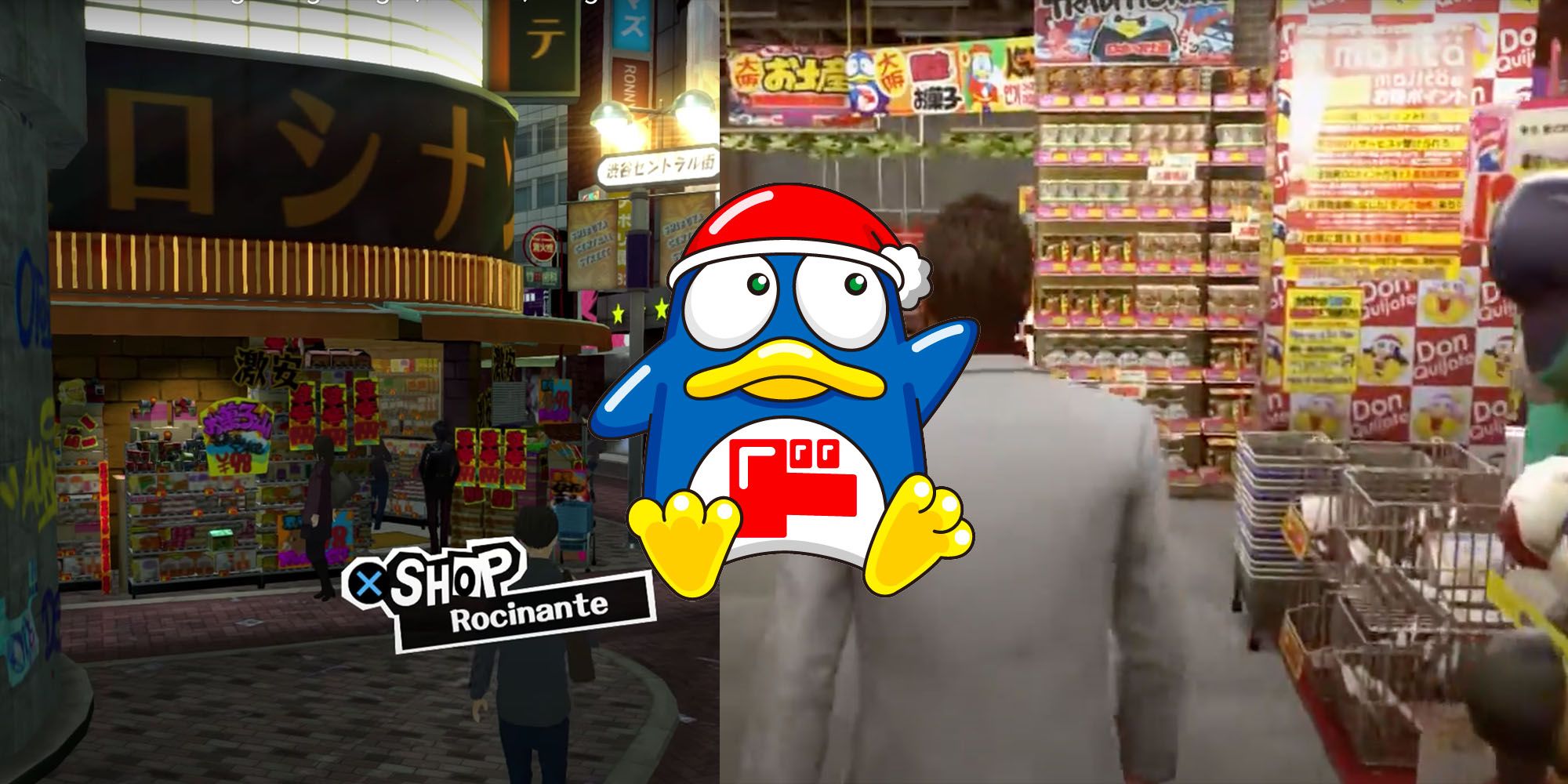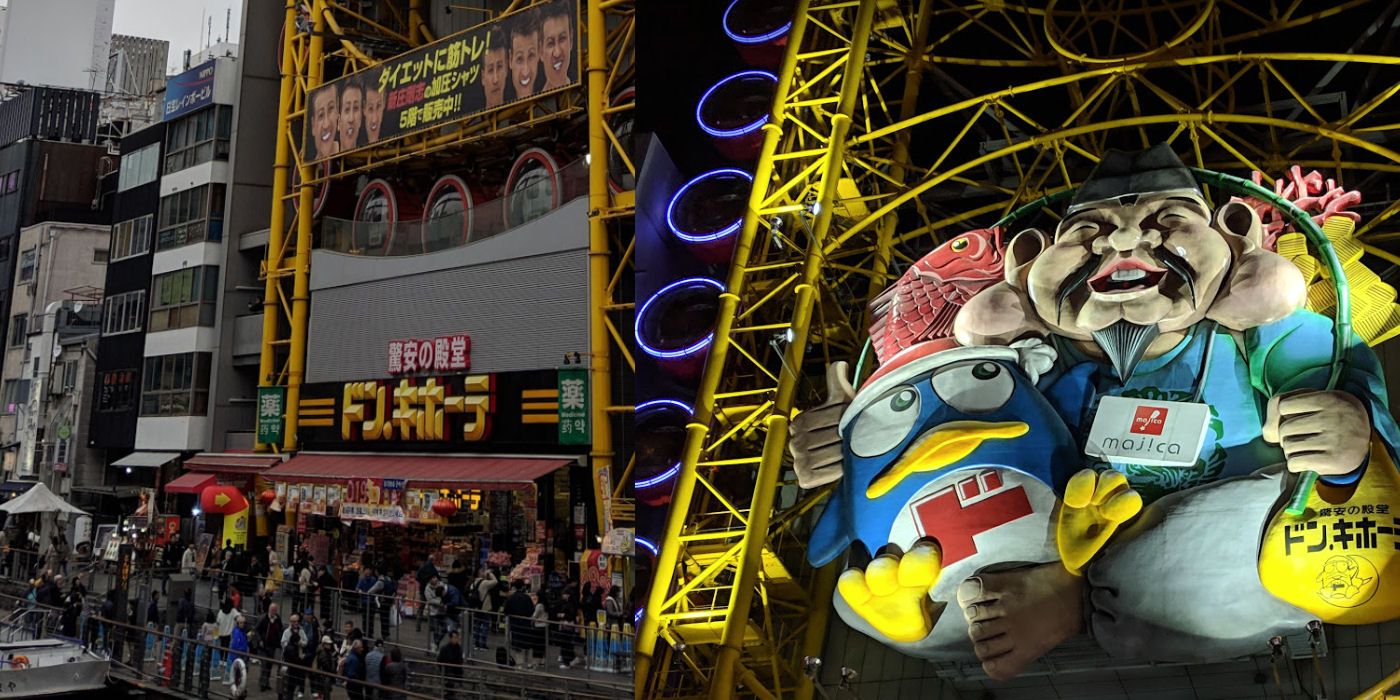The Yakuza series does an impeccable job of depicting Tokyo down to the smallest detail. Yakuza games are by no means the only JPRGs which depict the Japanese capital in loving detail - Atlus Games is also gifted at depicting Japan, particularly in Persona 5. Both these games choose one iconic Japanese store as a location to purchase battle-buffing items: Don Quijote (in Japanese, ドンキホーテ, or "Donki" for short).
The store's depiction is slightly different in the two games, seemingly because the Yakuza series has full rights to use Don Quijote's brand (including its incredible theme song), while Persona does not. Yakuza's Donkis have a picture-perfect exterior, with repeated uses of the store's trademark penguin mascot throughout. Yakuza's stores even have their own version of the Don Quijote jingle, which plays incessantly over speakers in the real thing.
Persona 5 had to go with a parodic approach, as with many other recognizable stores in the game - the Triple Seven convenience store, for instance, is an obvious stand-in for 7-Eleven. The style of the displays and marquee at the "discount store" in Persona 5's Shibuya Central Street give it away as a Don Quijote. However, without the rights to the store, Persona 5 had to name their version "Rocinante". This naming twist is a clever reference to a horse of the same name, originally made famous by the store's namesake in Cervantes' classic novel Don Quixote from the early 17th century. The long-running anime One Piece, which (like Donki) is popular in Japan, has also brought these names back into the pop-culture zeitgeist - one of the major villains in One Piece also has a brother named Donquixote Rosinante.
What is Don Quijote, And Why Do Japanese Games Love It?
When Westerners google "Don Quijote," they will likely find it described as a "discount store." While this is true to a certain extent, many Don Quijotes also have luxury purses, watches, and sunglasses on their top floors. "Discount store" doesn't really get at the complex, mammoth thing that Don Quijote embodies. Donkis are typically either sprawling single floors, or tall, several-story affairs (Shibuya's is seven) - sometimes both. Either way, they're packed with merchandise. Yakuza Kiwami 2 demonstrates the hyper-stimulation and barely controlled chaos of a Donki perfectly, as shown in the YouTube video below, posted by user MikedieONE. The store's website says it best: "We have an overwhelming array of products, from toilet paper to high-end brand products!"
Many Japanese businesses have their own mascots, and Donki's is Donpen, a blue penguin in a Santa hat with the katakana character "do" on his stomach. Donpen can be found all over Don Quijote, guiding shoppers through the labyrinthine store's wares. Donkis truly sell almost everything: socks, pencil holders, area-specific candy specialties, mugs, dildos, and more. It's not uncommon to find a display marquee which features a cute novelty Kirby pencil for children and a sex toy right next to each other. No wonder Donki's website recently opened a "Donki strategy" section.
In Japan, Don Quijotes are a beloved staple of urban life. They're peppered throughout Japanese cities, and major tourist areas will generally have more than one. The sheer size and number of their stores is a testament to their status as a staple of urban Japan's commerce, especially for tourists. So for games like Persona 5 with its Japanese urban fantasy, or the (somewhat) more grounded Yakuza series, which use place as a major selling point, Japanese cities are often depicted with great attention to detail. As such, the selection of stores would feel incomplete without a Don Quijote.
Source: MikedieONE, Don Quijote


